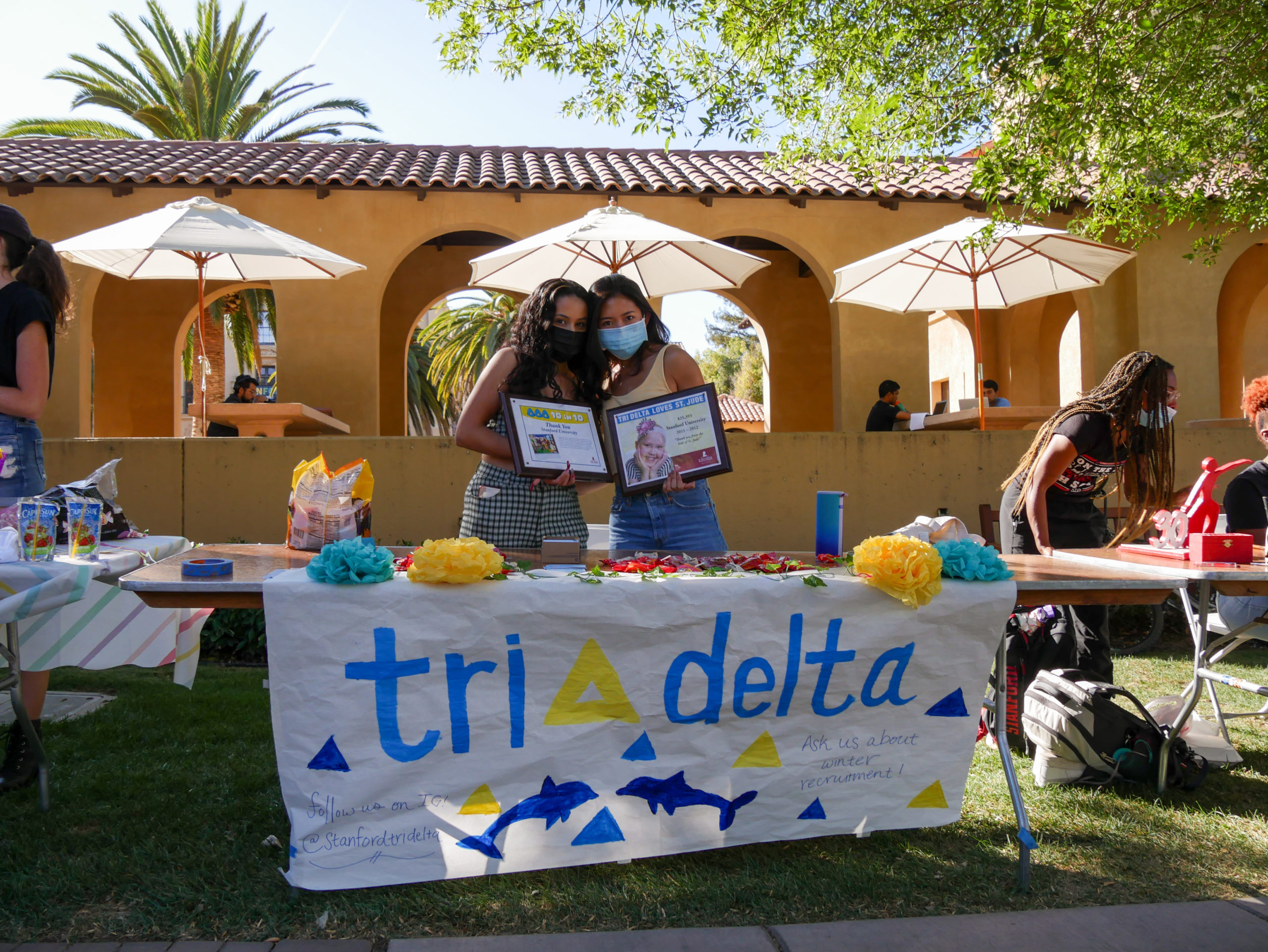Delta Delta Delta (Tridelt) announced on Sept. 21 that it will not participate in fall Inter-Sorority Council (ISC) recruitment due to concerns about equity and the mental health of recruits.
Tridelt’s leadership team also plans to meet with Abolish Stanford Greek (ASG) to discuss their plans for off-season recruitment during winter quarter and the future of their organization.
This announcement comes in the wake of conversations about systemic issues within Greek life. ASG members previously voiced their concerns in Daily op-eds, in which they questioned Greek life’s ability to be accessible to all members of the Stanford community.
ISC typically recruits potential new members in the spring to allow students to acclimate to being on campus. However, due to the pandemic, the majority of sophomores were not on campus during the spring to participate. To account for this, ISC is recruiting sophomores from Oct. 6 to Oct. 12.
However, Tridelt’s leadership team is concerned that sophomores’ lack of experience on-campus leaves them unprepared to make the choice to join a sorority. Rather than participating in ISC’s fall recruitment, Tridelt will be hosting their own recruitment early winter quarter.
“To bypass this waiting period and ask sophomores to rush so soon into their campus experience is incredibly disturbing,” Tridelt’s recruitment team and executive board wrote in an op-ed published in The Daily. “It privileges those who can easily envision themselves within a sorority — those who are white, class-privileged, cisgender and/or who have family that went to U.S. colleges or participated in Greek life themselves — and disadvantages those who cannot.”
ASG Lead on Underclassmen Affairs Haley Stafford ’24 expressed support for Tridelt’s decision. ASG is “encouraged that incumbent ISC leaders and orgs continue to show that the whole Stanford community recognizes the severe and fundamental harms that the current IFC/ISC system causes,” Stafford wrote.
However, off-season recruitment can also exacerbate inequities between potential recruits, according to Stafford. Off-season recruitment can be more susceptible to “dirty rush,” a process “whereby those who know the Greek system (drink alcohol, use drugs, or have the wealth to pay for a similar lifestyle) will be more likely to get bids,” she wrote.
Tridelt’s leadership acknowledged the concerns raised by ASG. Conversations surrounding accessibility and equity have been going on internally for a few years, according to Tridelt’s Co-Vice President of Membership Experience Sabrina Raouf ’22.
Tridelt’s current leadership plans to meet with ASG to discuss their recruitment plans — and the meeting has been long-awaited. The leadership team wanted “to be very intentional on what those conversations would look like” before meeting with ASG, according to Tridelt President Sarah Lee ’23. Now that the leadership team has spent two quarters leading Tridelt, Lee said they feel prepared to engage in productive conversations with the organization.
“I know that they are our peers, — ultimately who are looking out for communities who do not normally have their voices heard,” Lee said. “We really respect the work that they do.”
While Tridelt has been engaging with issues of equity in Greek Life, Lee said the value of inclusivity could have been centered with “an awful lot more urgency and expediency” in previous recruitment rounds. However, with increased activism from ASG, Lee said that Tridelt feels more secure in making “radical actions and changes.”
While Tridelt is still developing its off-season recruitment process, a critical component will be ensuring potential new members have the opportunity to form friendships during recruitment, according to Brentley Sandlin ’22. Even if everyone is not formally accepted into the organization, “they still feel like they’ve made friends throughout the process so that they can still be in this community,” Sandlin said.
This year, there are a number of students living in the Tridelt house, located at Cowell Cluster, who are not members of the organization. Recognizing the potential for split between members and non-members in the house, Lee said they are prioritizing ensuring non-members feel included and have access to all bonding events and community work.
“Dues and financial accessibility is something that weighs heavy on all of us, and making sure that that’s never a reason why someone feels like they cannot join an organization at Stanford is one of our top priorities,” Lee said.
Even with Tridelt’s changes to the recruitment process, ASG still believes that, in order to create a more equitable system, all housed Greek organizations should work towards creating “a fully un-housed Greek system whose members’ housing is fully integrated with the rest of campus,” Stafford wrote.
Tridelt Nationals confirmed that they were working with Stanford’s chapter for off-season recruitment, through a process known as Continuous Open Bidding (COB). COB “allows for intentional outreach to potential new members that did not choose to participate in the formal recruitment process,” according to spokesperson Mindy Tucker.
Though Tridelt leadership recognizes that there will be challenges with changing their organization, they are hopeful that they can make their organization more accessible.
“We are currently prioritizing the rebuilding of our in-person community and collective healing given the transition back to in-person campus life during the pandemic,” Lee wrote. “That being said, we have been holding active conversations with our National organization about what is best for our community.”
